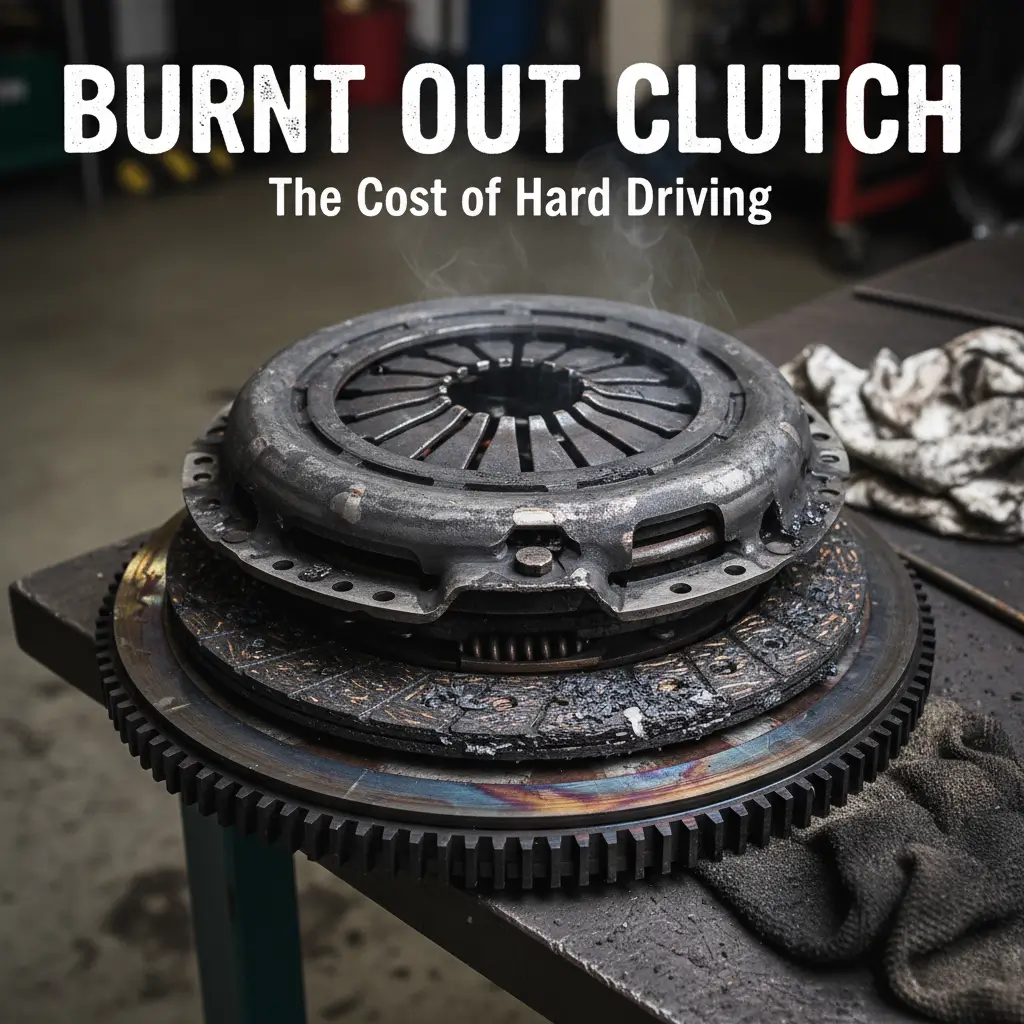Burnt-Out Clutch Symptoms, Causes and Consequences
A comprehensive guide to understanding, identifying, and dealing with clutch failure in your vehicle. Learn the warning signs, causes, and prevention methods to avoid costly repairs.

Researched by Craig Sandeman. Content based on automotive industry research.
Important Notice
A clutch burned out situation is not uncommon for novice car enthusiasts. If misused, this unit can be disabled in just a few hours, and the machine will be immobilized. This guide will help you understand what to do in this critical situation.
Video Guide: Clutch Problems Explained
Watch this detailed explanation of clutch problems and solutions from automotive experts.
Causes of Clutch Failure
If the clutch on your car has burned out, it means that the car has experienced increased loads. This happened for several key reasons:
Aggressive Driving
Rapid acceleration, incorrect uphill starts, or aggressive gear changes can cause excessive friction and overheating.
Heavy Towing
Towing trailers beyond your vehicle's capacity puts excessive strain on the clutch mechanism.
Pro Tip: Trailer Weight Guidelines
According to Road Traffic Regulations, the weight of the vehicle towing the load must be greater than or equal to the trailer's mass. This prevents clutch failure and ensures safe operation.
Signs of a Burnt Clutch
Primary Warning Sign
Burning Smell: If you smell smoke, it means the driven disk is scrolling and rubbing against the flywheel with great force due to overheated friction linings.
Key Symptoms to Watch For:
Car Cannot Move
The vehicle doesn't run even when you release the clutch, indicating the disc isn't pressed down enough.
Jerky Movement
The car moves in jerks and has difficulty picking up speed, especially in first gear.
Increased Pedal Travel
You'll notice the clutch pedal free travel has increased significantly.
Difficult Gear Shifting
Gears are hard to switch even when the pedal is fully depressed, indicating incomplete disengagement.
Methods of Driving with a Burnt-Out Clutch
Automatic Transmission Warning
If you have an automatic transmission, you'll need to call an evacuation service. The electronics will block the mechanism, and you won't be able to drive.
Manual Transmission Emergency Driving:
Emergency Technique
To start from a place without slipping the disc, the torque must be as low as possible. Use second or third gear instead of first gear.
Step-by-Step Process:
- Turn on second or third gear (avoid first gear)
- Increase engine revs to reduce friction force
- For gear changes, use rebasing technique
- Switch to "N" position, increase revs to 3000, then engage second speed
Consequences and Repair
Driving with a burnt clutch can lead to severe mechanical damage and expensive repairs. Here's what happens when you continue driving:
Flywheel Damage
Uneven overheating causes deformation and creates blue spots on the flywheel surface.
⚠️ Blue spots indicate severe overheating and potential cracking
Component Failure
Fork, bearings, and damper springs become unusable due to excessive heat.
💰 Dual-mass flywheels (VW, Audi, Honda) are particularly expensive to replace
Critical Action Required
When you notice a burning smell or jerky movement, go to a car service immediately. Continuing to drive will require complete clutch and flywheel replacement.
Prevention of Clutch Breakage
Follow these essential guidelines to prevent clutch failure and extend your vehicle's lifespan:
Smooth Operation
Don't release the clutch abruptly; shift gears smoothly and progressively.
Proper Timing
Don't press the clutch pedal in advance or keep it depressed when stopping.
Appropriate Gearing
Use appropriate gears for speed and don't overload your vehicle beyond capacity.
Quick Starts
Start moving faster, then switch through gears following manual transmission guidelines.
Frequently Asked Questions
How do I know if my clutch is burnt out?
The primary sign is a burning smell, followed by difficulty moving the car, jerky movement, increased pedal travel, and hard gear shifting.
Can I drive with a burnt clutch?
Only in emergency situations and for short distances. Use second or third gear instead of first, and get to a service center immediately to prevent further damage.
How much does clutch repair cost?
Costs vary significantly. Simple friction lining replacement is cheaper, but if the flywheel is damaged, especially dual-mass flywheels in VW, Audi, or Honda vehicles, repairs can be very expensive.
What causes clutch to burn out quickly?
Aggressive driving, incorrect uphill starts, heavy towing beyond vehicle capacity, and getting stuck in mud or snow while over-revving the engine.
How can I prevent clutch failure?
Drive smoothly, don't hold the clutch pedal unnecessarily, use appropriate gears, avoid overloading your vehicle, and follow proper manual transmission techniques.

Written by Craig Sandeman
Automotive expert with over 15 years of experience in vehicle diagnostics and repair. Specializing in VW parts and mechanical troubleshooting.
Connect on LinkedIn